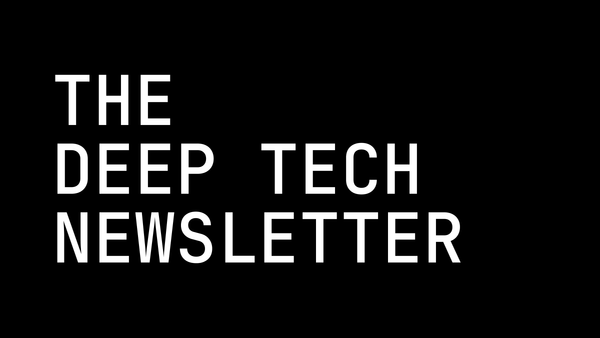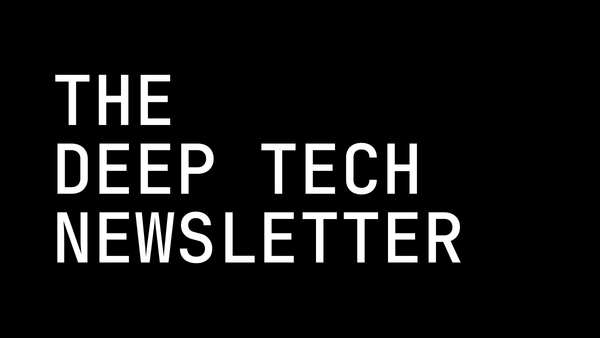DTN 019: The AI Boom has a Chip Problem
Plus: Most aliens may be AI, a crypto-longevity research state called Zuzalu, crypto investment is down bad, and more.

Welcome to The Deep Tech Newsletter, a weekly exploration of the business, science, and engineering behind the world’s most important frontier technologies.
The Big Picture
The AI Boom Runs on Chips, but It Can’t Get Enough
“A shortage of the kind of advanced chips that are the lifeblood of new generative AI systems has set off a race to lock down computing power and find workarounds. The graphics chips, or GPUs, used for AI are almost all made by Nvidia. But the boom in demand for them has far outpaced supply with the viral success of ChatGPT, a chatbot that is able to respond to questions in humanlike ways.That situation has restricted the processing power that cloud-service providers like Amazon.com and Microsoft can offer to clients such as OpenAI, the company behind ChatGPT. AI developers need the server capacity to develop and operate their increasingly complex models and help other companies build AI services. (Wall Street Journal)
The world is finally spending more on solar than oil production
“The world saw about $2.8 trillion of investments in energy in 2022, with about $1.7 trillion of that going into clean energy according to the International Energy Agency’s annual report on global investment in energy. That’s the biggest single-year investment in clean energy ever. In 2022, for every dollar spent on fossil fuels, $1.70 went to clean energy. Just five years ago, it was dead even. In 2023, for the first time, investment in solar energy is expected to beat out investment in oil production.” (MIT Tech Review)
Longevity enthusiasts want to create their own independent state
“Around 780 such people gathered at this “pop-up city” in Montenegro to work out how they might create such a state—a place where like-minded innovators can work together in an all-new jurisdiction that gives them free rein to self-experiment with unproven drugs. Some attendees are just visitors, passing through. But the dedicated among them have been living here for almost two months. Welcome to Zuzalu.” (MIT Tech Review)
Read our interview with Laurence Ion for more on crypto-fueled medical innovation districts
Building a Better NIH
“NIH is arguably the most important institution shaping the rate and direction of scientific research, in an area – health – that has enormous implications for human well-being. Even very small improvements in the productivity of how NIH funding is spent could translate into massive improvements in social welfare. Basic research funding through NIH awards are the bread-and-butter of funding support for most U.S.-based academic biomedical researchers, and around 50% of patents linked to drugs approved by the US Food and Drug Administration directly cite NIH-funded research. These short proposals are meant to open a conversation about practical, tractable reforms that could be considered in the coming years.” (Brookings Institute)
WE’RE HIRING
We’re looking for writers, editors, and communications pros to join our team. You’ll have a front row seat for the future and tell the stories of the world’s most innovative deep tech startups. Learn more on our website or drop us a line: careers@hausb.io
Deep Tech News
- Major U.S. geological survey aims to uncover minerals critical for batteries and microchips
- NASA’s Year-Long Mars Simulation Is a Test of Mental Mettle
- Rocket Lab’s private mission to Venus slips to 2025
- Lidar and the Future of Computer Vision
- No ChatGPT in my court: Judge orders all AI-generated content must be declared and checked
- Axiom Space concludes second private mission to ISS
- Linux Foundation Europe launches RISE, the RISC-V Software Ecosystem project
- VCs are betting on defense tech in 2023
- Japan will try to beam solar power from space by 2025
- UAE announces groundbreaking mission to asteroid belt
- An EV Drive Unit Built Without Rare Earth Minerals
Crypto News
- Crypto VCs face a harsh reality in the bear market
- Most Bitcoin Inscriptions belong to a single person
- NFL labor union is out almost $42M thanks to crypto collapse
- Russia Drops Plans for State-Run Crypto Exchange
- Bitcoin transaction fee revenue soared this month thanks to Ordinals
Peer Review
- AI software can provide 'roadmap' for biological discoveries
- MIT researchers develop self-learning language models that outperform larger counterparts
- Improving ground-mounted solar power plant performance via orbiting reflectors
- Engineers harvest abundant clean energy from thin air, 24/7
- Small fusion experiment hits temperatures hotter than the sun's core
- New 3D stretchable electronics can advance organ-on-chip technology
- Calcium metal battery capable of more than 500 cycles
Funding x M&A
DEEP TECH
- Lightmatter’s photonic AI hardware is ready to shine with $154M in new funding
- Hyperspectral imagery startup Pixxel closes $36M Series B led by Google
- Ceibo unearths $30M Series B to extract more copper out of existing mines
- DOE targets nuclear fusion pilot plant design in 5 to 10 years as it announces $46M in funding
- Pluton Biosciences takes its carbon-fixing microbes to market with a fresh $16.6M
CRYPTO
- M80 raises $3M to build first web3-enabled esports team
- Chainalysis acquires real-time crypto data company Transpose
- Orbofi AI, a leading generative AI engine for web3, raises $2.8M
- PayPal Ventures leads $52M round for web3 onboarding startup Magic
Miscellanea
DARPA hacked a science writer’s brain and turned her into a sharpshooter / Most Aliens May Be Artificial Intelligence / US military has been observing ‘metallic orbs’ making extraordinary ‘maneuvers’ / How to prepare a hardware startup for raising a Series A / Antarctica’s longest-running newspaper / AI Camera with No Lens / The Quest to Use Quantum Mechanics to Pull Energy out of Nothing / Discovery of 2000-year-old 'computer' / One Click Deepfake / A Jungle Prison Becomes a Spaceport



